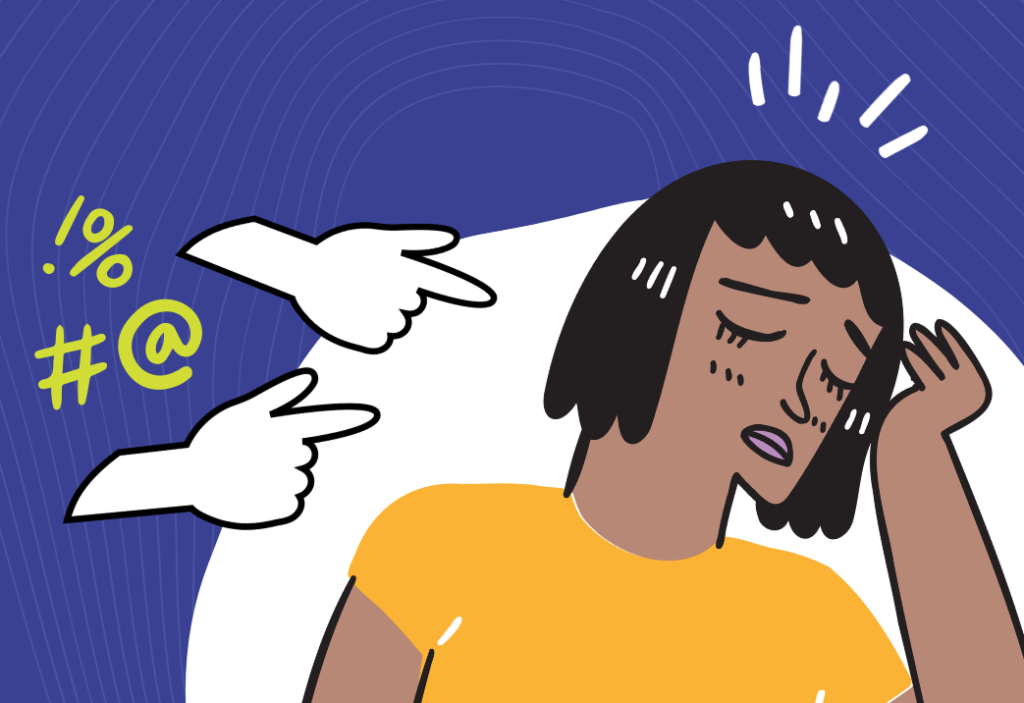6 Steps To Take If You’re Being Bullied

Bullying is when someone repeatedly does something that hurts someone else emotionally or physically. Bullying is never right. Your school and local government have a legal duty to stop it. Here are 6 steps to follow if you’re being bullied.
This article is also available in Welsh – I ddarllen y cynnwys yma yn Gymraeg – clicia yma
1. Talk to Someone
Being bullied can make you feel pretty rotten and miserable, and you could probably do with someone else’s support. Reach out and talk to someone that you trust about what’s been happening. This could be a parent, a favourite teacher or a best mate. You might be worried about ‘snitching’ on someone, but you have a right not to be bullied, and if this is happening to you, you should try and do something about it.
If you tell someone you trust, you can ask them to keep your report anonymous. There are tactics that they can use without drawing attention to you, like having a bullying assembly for the whole school rather than targeting the bullies directly. If you talk to someone, you will get the emotional support you need, and you can discuss what steps you want them to take. It will help you put things into perspective, and they might see a risk that you don’t. Perhaps they can suggest and discuss a coping strategy with you. A problem shared is a problem halved.
2 Communicate with the bullies
The bullies are human too. If it’s safe and you feel confident enough, try talking to those you feel are bullying you. They might not realise the impact that their words or actions are having on you. Ask them to imagine how they would feel if they were in your shoes. If they’re willing, maybe you could ask for an agreement that they will stop what they’re doing. If more than one person is bullying you, then try to have this conversation with them one by one. Doing this might give you more of a chance to say what you want to say without being intimidated by a big group of people. It might be best to skip this step if the bullying is physical and you can’t approach them without fear of being physically hurt. Don’t put yourself in danger!!
If the bullies use violence against you, then this is illegal and you can report to the Police on 101.
3. Look after yourself
There are things you can you do that will help you cope.
Keep track of the bullying. If you decide that you will report it later, it will help to note all the things that have happened, like who was involved, dates, etc. This helps to build up a picture and provide evidence. You could even film it on your mobile phone if it’s safe for you to do so. It might put the bullies off doing anything, or it can be used as evidence. Bullies might think twice if there’s a chance they’ll be exposed as being cruel or violent. If you do film anything don’t share this on social media; keep it as evidence.
Bullying can have a physical and emotional impact on someone, so it’s important to look after yourself mentally. If the bullying gets you down and makes you feel anxious or depressed, then reach out for help. You can talk to one of our advisers here at Meic who can help (contact details below). The Welsh Government has created a Mental Health Toolkit on Hwb with lots of links to help and advice.
4. Make an appointment to talk to the school
If things haven’t improved, then it might be time to take official action. Talk to a trusted adult. Ask them to arrange an appointment with your teacher or head of year to see what can be done to support you. Every school has to have an anti-bullying policy, it might be on their website, or you can request to see it as you have a right to access it. The policy will note the steps that the school should take to support someone who’s being bullied and stop it. At this stage, the school should put things in place to help. It’s important to talk to a supporting adult about what’s been happening each day. This will let you get things off your chest and also give them a chance to record all incidents to further support your cause at school.
5. Follow it up
If the bullying continues and the school isn’t doing enough to stop it, or the things they’ve done isn’t working, your parents/guardians should go back to the school for another meeting. They can then consider further steps to get the problem resolved. At this stage, it might be worth writing a letter to the school, telling them that the bullying is continuing.
6. Make official complaints
The School:
If you don’t feel that the school is doing enough, your parents/guardian might want to consider making a complaint to the school. It is best to do this in writing by sending a letter to the headteacher. BulliesOut has great template letters for making complaints.
The School Governors:
If things haven’t changed or they’re worse since you made your complaint to the headteacher, and if you feel that the school hasn’t done what it should have, then perhaps it’s time to go higher. Send a complaint to the Board of Governors to see if things can get sorted at this level. The school and the headteacher are answerable to the board. Check out the complaint letter template to the board of governors on the BulliesOut website.
The Education Authority:
You need to ensure that you’ve given enough time for the school to respond and act upon your complaints. It may be difficult to wait, but it’s an essential part of the process. You can consider further steps if things still don’t get better. The next step is for your parents/guardians to make a complaint to the Local Education Authority. You can find details of their office on your local council website. There is a template for this letter on the BulliesOut website too.
The Ombudsman:
If the Education Authority doesn’t resolve things, your parents/guardians can approach the Ombudsman for Wales if you’re still being bullied. They can look into complaints made about the local council or any public services. Find out how to complain on their website.
The Government:
You can talk or write directly to government representatives who are responsible for making laws and policy in Wales:
- Local councillor
- Local Senedd Member (MS)
- Children and Young Person’s Education Committee
- Local Youth Parliament member
The Children’s Commissioner:
The Children’s Commissioner is an independent advocate (fights for your rights) for children and young people in Wales. The UNCRC (find out more here) makes sure that all children and young people have rights, and the Children’s Commissioner makes sure that your rights are met here in Wales. You have a right not to be bullied.
The Police:
There are times that bullying becomes illegal and you can report it to the Police on 101. If you are in immediate danger call 999:
- Violence
- Assault
- Theft
- Harassment
- Intimidation
- Hate crimes (disability, race, religion, sexual orientation, or transgender identity)
Our other bullying blogs:
- Do Something Kind This Anti-Bullying Week
- A Right Not To Be Bullied
- Choose Respect This Anti-Bullying Week
- Cyberbullying: Stop Speak Support
- Banter or Bullying?
Need more information?
We really hope that you will never need to follow all the steps above; however, they are there for you and your parents/guardians if you need them. If there’s anything that you don’t understand, then please contact Meic.
Meic is an information and advocacy helpline for children and young people aged 0-25 in Wales. We are open 8am to midnight, 7 days a week. You can contact us free on the phone (080880 23456), text message (84001) or online chat.


























